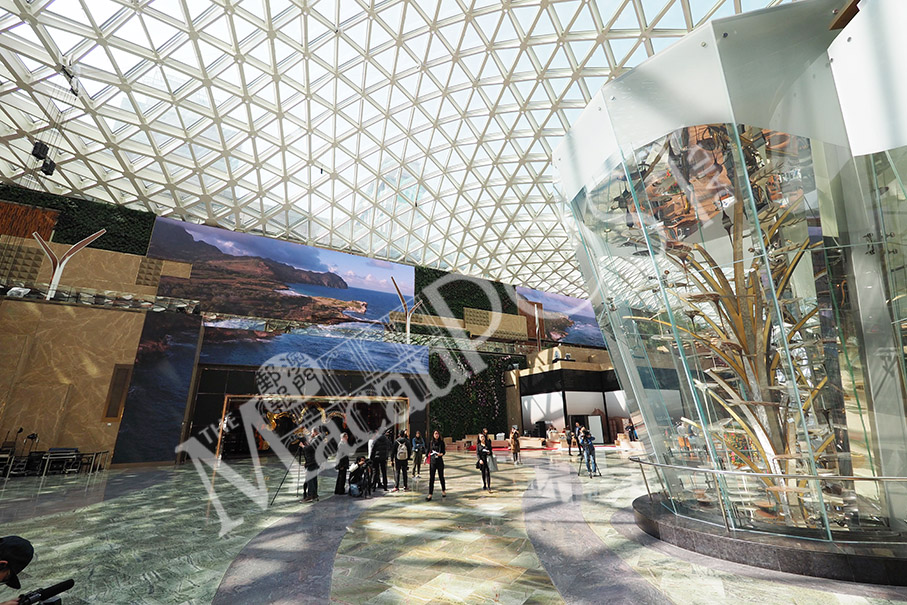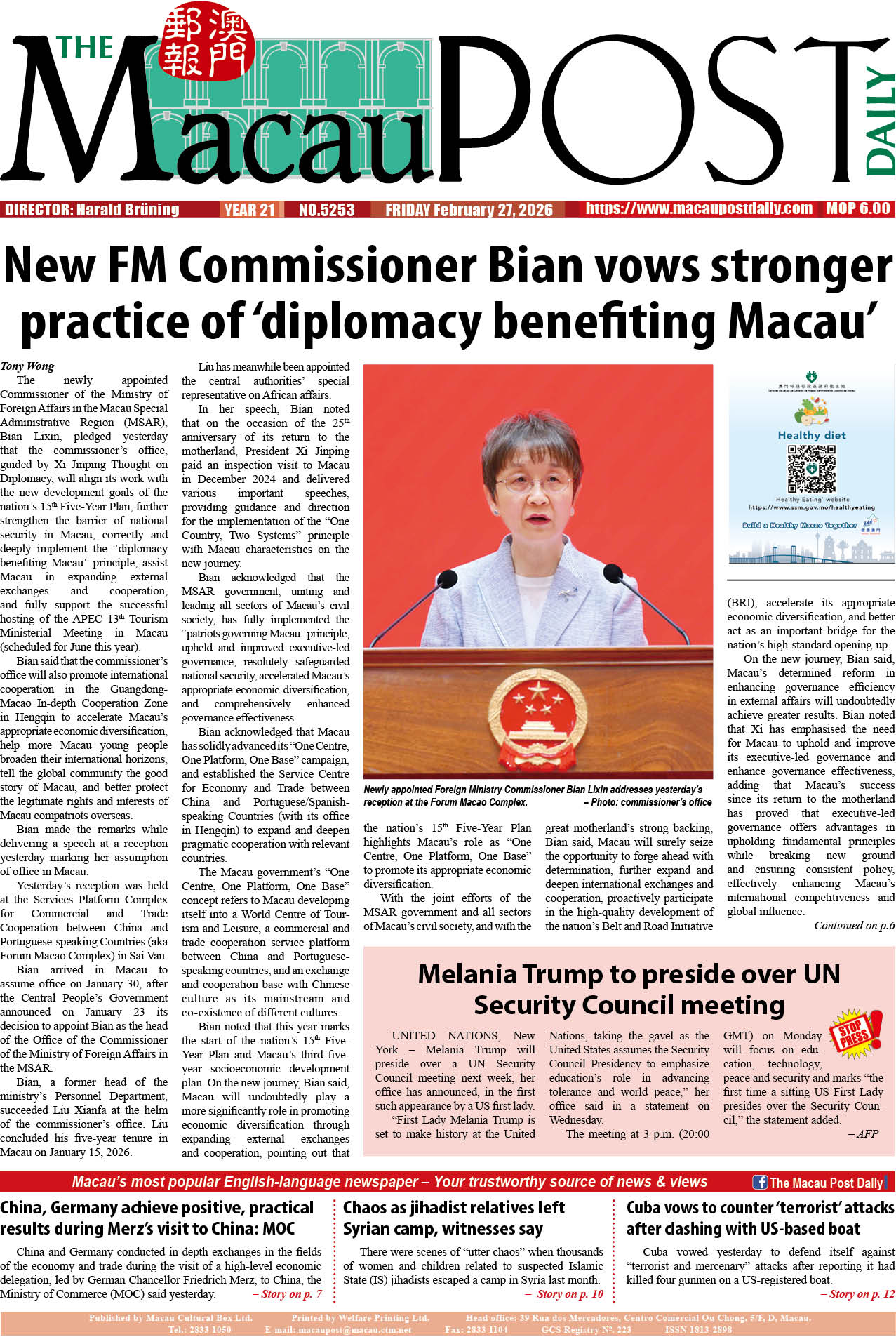The health chief also said that the government has made the decision as the new 14-day-quarantine measure for non-resident workers has been implemented for eight days and no new COVID-19 cases have been confirmed in Zhuhai and Zhongshan for 9 and 10 consecutive days respectively.
Chief Executive Ho Iat Seng ordered the temporary closure of the city’s casinos and other entertainment venues on February 4 when the number of confirmed COVID-19 cases had risen from 8 to 10. Macau’s 41 casinos and non-gaming entertainment venues closed on February 5. The local government announced on February 17 that the city’s casinos could open for business from February 20, when 29 of the 41 casinos reopened. According to announcements by the Gaming Inspection and Coordination Bureau (DICJ) earlier this week, seven more casinos have resumed operations, bringing the total number of casinos that have reopened so far to 36.
The government said on February 17 that it had decided to keep the city’s non-gaming entertainment venues closed until further notice after considering that many of them had already closed their doors before February 5 because of the epidemic and a large decrease in the number of customers.
According to an executive order signed by Ho and published in the Official Gazette (BO) shortly before yesterday’s press conference – which started at 5 p.m., the non-gaming entertainment venue closure order will be lifted starting from 00:00 on Monday – meaning that the entertainment venues can restart business at that hour, the health chief pointed out.
According to an executive order signed by Ho and promulgated in the Official Gazette on February 4, the non-gaming entertainment venues which have been closed since February 5 comprise cinemas, theatres, indoor playgrounds, amusement arcades, Internet cafes, snooker parlours, bowling alleys, public saunas, massage parlours, beauty salons, gyms, health clubs, karaoke bars, bars, nightclubs, discos, ballrooms and cabarets.
During yesterday’s press conference at the bureau adjacent to the public Conde de São Januário Hospital Centre, Lei said that the non-gaming entertainment venues will only be allowed to be operated in a “limited” way for the time being and that their operations will be subject to a string of COVID-19 prevention and control measures.
Lei quoted World Health Organisation (WHO) Director-General Tedros Adhanom Ghebreyesus as saying yesterday that even though the epidemic in mainland China has started to ease, the epidemic in various regions across the world has only now started to escalate. The number of new COVID-19 cases confirmed in foreign countries in a day exceeded the number in mainland China on Tuesday for the first time, Lei quoted the WHO chief as saying. Tedros stressed yesterday that all countries must well prepare for a possible pandemic, according to Lei, who said that “the epidemic in many regions across the world is constantly escalating”.
Education and Youth Affairs Bureau (DSEJ) Director Lou Pak Sang (left) speaks during yesterday’s press conference at the Health Bureau (SSM) about the city’s novel coronavirus (COVID-19) situation, as SSM Director Lei Chin Ion (centre) and Lo Iek Long, one of the three clinical directors of the public Conde de São Januário Hospital Centre, look on. Photo: Tony Wong
Lei noted that his bureau has formulated the official guidelines for the city’s entertainment venues to resume operations, adding that the guidelines have four major principles.
Firstly, staff members must always wear a facemask and customers should also wear a facemask as far as they can, Lei said, adding that customers should only take off their facemasks when eating and drinking, and if they need to take off their facemasks, they should try to minimise the time period. Lei also said that customers should also wear a facemask when they are exercising in a gym or dancing, adding that wearing a facemask would not prevent people from doing exercises. “Wearing a facemask will not result in difficulty in breathing. There is no problem when our medical staff members wearing a facemask are engaged in difficult surgical operations for over 10 hours,” Lei said.
Secondly, staff members must refuse anyone with a fever or other respiratory symptoms to enter their entertainment venues, Lei said.
Thirdly, the maximum number of customers at a venue must not exceed half of the designed maximum number. The operator of a venue must ensure that customers have a distance of at least one metre between each other, particularly in cinemas where customers are typically staying for a long time, according to Lei.
Lei said that those entering the entertainment venues have to present a self-filled health e-declaration – which is valid for one day.
Fourthly, all people – staff and customers – should strictly adhere to good personal hygiene. Operators and staff members of the venues should ensure good environmental hygiene, according to Lei, who also said that high-risk services, such as procedures involving sprays in beauty salons, should not be carried out for the time being.
Lei said that inspectors of the respective government entities regulating the entertainment venues will carry out inspections to check whether the venues are carrying out all the required epidemic prevention and control measures in line with the official guidelines. The respective government entities will order the venues which breach the guidelines to correct their conduct, otherwise facing the possibility of a mandatory shutdown.
Tutorial centres can open again on Monday
Lei also said that private tutorial centres and continuing education institutions can also resume operations on Monday.
During yesterday’s press conference, Education and Youth Affairs Bureau (DSEJ) Director Lou Pak Sang said that the tutorial centres and continuing education institutions will have to provide their services in different time slots when they resume operations from Monday.
According to Lou, the operations of the tutorial centres and continuing education institutions will be subject to a string of epidemic prevention and control measures. Firstly, the maximum number of pupils in a venue at the same time must not exceed half of the maximum number stipulated by its licence, Lou said.
Secondly, seats must have a distance of at least one metre between each other, Lou said. Thirdly, the tutorial centres must not provide their pupils with meals, refreshments and afternoon naps, Lou said.
Fourthly, staff and pupils or students must have their temperature checked and wear a facemask before entering the premises, Lou said.
Classes could resume in late April
Meanwhile, Lou said that classes in local schools could resume in late April or even earlier.
During yesterday’s press conference, Lou said that his bureau had “provisionally” come up with a host of criteria as to when school classes could resume in Macau. Lou said that classes could be resumed after two conditions have been met. Firstly, no new COVID-19 cases have been confirmed in Macau and Guangdong for 14 consecutive days, and secondly, both the Zhuhai and Zhongshan education authorities have announced the resumption of classes in the two cities. While Zhuhai abuts Macau, Zhongshan lies 40 kilometres north of Macau.
Lou said that after the two conditions are met, his bureau will make a formal announcement 14 days before the resumption of classes in local schools.
Lou said that based on a provisional assessment by the local government about the epidemic in neighbouring regions, his bureau believes that classes could resume in late April, or even earlier.
Lou noted that Guangdong has not confirmed a new COVID-19 case for two consecutive days, on Tuesday and Wednesday. He said this meant that classes in schools in Macau could resume as early as around 28 days from now.
8th COVID-19 patient discharged
Meanwhile, Lo Iek Long, a clinical director or the public hospital, announced the discharge of the eighth COVID-19 patient, a male Macau resident – the 10th and so far last confirmed novel coronavirus case.
According to Lo, upon his discharge from the public hospital the 56-year-old casino shuttle bus driver was immediately transferred to the Health Bureau’s quarantine facility in Coloane for 14 days of medical surveillance. He is the first of three local COVID-19 patients to have been discharged. The seven previously discharged patients are all Wuhan residents who came to Macau as tourists. The driver had been in hospital since February 4, when Macau’s last two novel coronavirus cases were confirmed.
Lo said the 14-day medical surveillance period was needed to reduce the risk of transmission of the novel coronavirus in the community.
A number of cases have been reported in the mainland where COVID-19 patients who had been discharged as cured from the hospital later tested positive to the disease again.
The novel coronavirus is said to normally have an incubation period of 14 days.
Lo pointed out that local residents treated for an infectious disease are automatically exempted from the payment of hospital fees.







